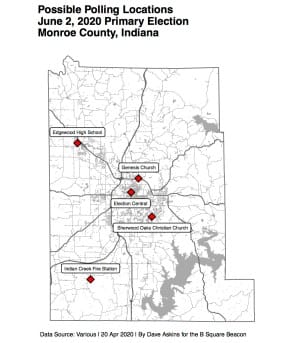Polling place consolidation, ballot application mailing mulled by Monroe County election board

At an emergency work session held Monday morning, Monroe County’s three-member election board took some initial steps towards implementation of the in-person primary elections described in Friday’s order by the state’s election commission.

Two key strategies are part of Monroe County’s plan deal with this year’s pandemic-impacted primary election.
First, the election board is looking to reduce the number of polling locations, to decrease the number of required poll workers.
Second, they’re looking at the possibility of mailing a ballot application to all roughly 100,000 registered voters in the county.
By encouraging voters to apply for and cast ballots by mail, election officials are hoping reduce the chance that poll workers and voters will infect each other with the COVID-19 virus.
The primary has been postponed, from May 5 to June 2 due to the COVID-19 pandemic, which as of Monday has caused 569 deaths in Indiana in the last month.
Some had hoped the state’s election commission would use its meeting last Friday to mandate a vote-by-mail election. Instead, the commission opted for in-person voting on Election Day, and a reduced period for early in-person voting—just a week, compared to the usual 28 days.
At Monday morning’s meeting election board members agreed they’d look into the possibility of mailing a ballot application to all registered voters in the county. By the time it meets next, on Thursday at 1 p.m., the board hopes to have a quote from local direct mail vendors as well as more information from a company called Quadient, which had sent board members a pitch for its direct mail and tracking services.
Chair of the election board, Hal Turner, said that extrapolating what Quadient had done for the state of Michigan and applying that to Monroe county, he figured it might cost around $300,000 to pay for the entire Quadient package, which includes tracking the mailing and handling responses to ballot requests.
The county’s election supervisor, Karen Wheeler, said the only service that Monroe County needs is the initial mass mailing to all 100,000 registered voters, not the followup sending of ballots.
The election board is looking at various ways of promoting voting by mail, which is an option made possible this year by the state election commission’s decision to allow no-excuse absentee voting for this year’s primary. That means anyone can request an absentee ballot without giving a reason.
County clerk Nicole Browne said she had offered to do in-person interviews with a half dozen radio stations. Other board members encouraged Browne to record public service announcements that could be replayed at set time intervals.
The consensus on the board appears to be that if a ballot application is not mailed to every voter, few voters are likely to request the application on their own, no matter what publicity efforts are made.
Election board members hope to be able to include in their mass mailing of ballot applications a notice to voters about changes to their polling locations.
Instead of the usual 34 different polling locations in Monroe County, election board members are looking to consolidate them into five sites—one for each compass point and one centrally located: Indian Creek Fire Station, Edgewood High School, Sherwood Oaks Christian Church, Genesis Church and Election Central downtown.
Those sites aren’t yet locked in, but they’re the preferred locations, according to county election supervisor Karen Wheeler.
Reducing the number of sites to five will reduce the number of poll workers needed. That should help solve the problem of recruiting poll workers, Wheeler said. Recruitment of poll workers is a challenge because they are generally older, thus in a higher risk category for COVID-19, making some of them reluctant to take the chance of getting infected by voters.
A couple of related strategies that election board members discussed on Monday could hit legal snags: vote centers; and scan-as-you-go ballot processing.
Board members want the five voting sites to function as “vote centers.” That means they would all be set up to handle a voter from any precinct in the county. But according to a state election division attorney who was reached by The Square Beacon, neither of the two recent orders issued by the state election commission allow for a county that has not already established vote centers to create them just for this primary election. Monroe county is not a vote-center county.
Wheeler also said at Monday’s meeting she wants to implement a scan-as-you-go approach to processing the absentee ballots. That means they’d be scanned as soon as they are received in the mail or voted early in-person. Normally, absentee ballots have to stay in their sealed envelopes until Election Day. If the labor of opening envelopes and scanning them can be dosed out over several days leading up to Election Day, the amount of Election Day work can be reduced, increasing the likelihood of timely results reporting.
Wheeler and deputy clerk Tressia Martin indicated at Monday’s meeting they’d heard from the state’s election division that scan-as-you-go would be allowed for this primary, even though it would violate the so-called “dead voter law.” Under the dead voter law, an absentee ballot has to be checked on Election Day to make sure the voter has not died between the time they cast their ballot and Election Day. The scan-as-you-go approach would flout that law.
Election board member Carolyn VandeWiele said that she did not like the dead voter law, but wanted to hear from the county’s legal team before adopting scan-as-you-go. The election division attorney to whom The Square Beacon spoke confirmed that scan-as-you-go is not allowed under the dead voter law, and that neither of the two recent orders by the state’s election commission had changed that.
Information about how to apply for an absentee ballot so that voters can send it in by mail is maintained online by Election Central staff.




Comments ()